
Hope for a huge, ancient and imperilled fish
First Nations are leading efforts to make sure lake sturgeon can find a home in...
On Aug. 3, 2023, the Alberta government announced a surprise seven-month moratorium on all new renewable energy projects, much to the surprise of the industry.
The government initially said its announcement was a response to requests from independent agencies that oversee the electricity system in Alberta, but successive revelations have proved that is untrue.
“The Alberta Electric System Operator asked for us to do a pause, to make sure that we could address issues of stability of the grid,” Smith said in August 2023 when pressed by reporters asking why the government made the decision. Smith added that the grid’s regulator, the Alberta Utilities Commission, also asked for the pause.
But behind the scenes, the government had spent months considering the moratorium and a related inquiry into renewable energy regulations in the province.
Hundreds of pages of documents, obtained by The Narwhal through freedom of information requests, show the government expressed its desire to halt projects only one month into its mandate. They show the government was behind the push, and not independent agencies as Premier Danielle Smith repeatedly claimed.
Internal emails obtained by The Narwhal also revealed that the top official at the Alberta Electric System Operator found the pause “very troubling” and was “not comfortable” with the decision. He was told to “support the minister without reservation.”
Here, then, is a timeline of what we know happened and when.
The Alberta election sees Danielle Smith, newly selected leader of the United Conservative Party, sweep to a majority government, defeating the opposition New Democratic Party to claim 49 of 87 seats in the legislature.
There is no mention of halting renewable energy projects in the party’s platform, nor mention of an inquiry into new regulations to govern renewables projects.
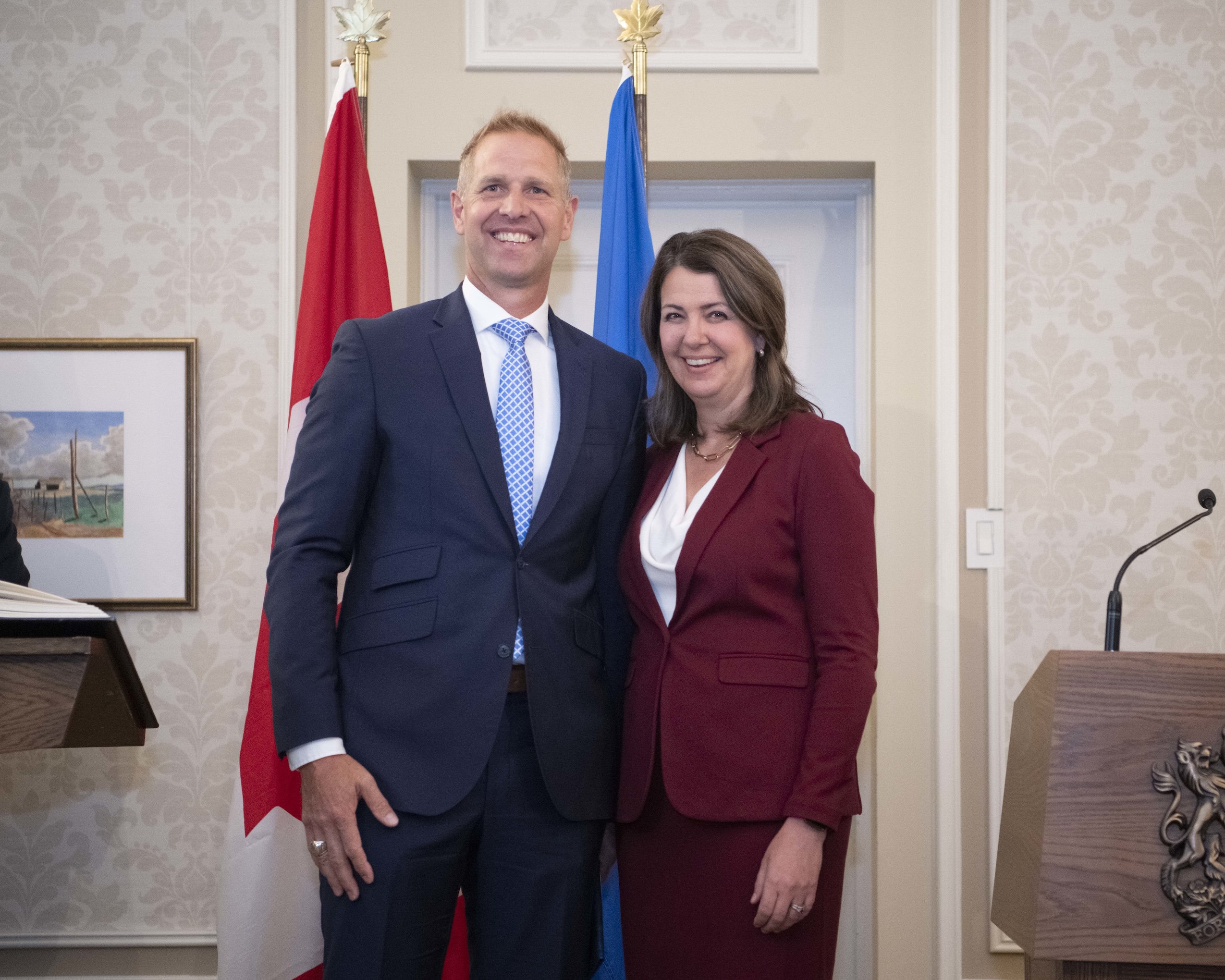
The new Alberta cabinet is sworn in, including Nathan Neudorf as minister of affordability and utilities. His mandate letter, dated July 19, directs him to push back against any federal net-zero electricity regulations but also to implement a plan to achieve a carbon neutral grid by 2050. That letter points to carbon capture, small modular reactors and “other emission-reducing technologies,” but no direct mention of wind and solar.
Neudorf is also tasked with reviewing the “operations, policies and mission of your agencies, including the Alberta Utilities Commission and the Alberta Electric System Operator.” The commission is the grid regulator and the operator oversees the day-to-day functioning of the grid and forecasts supply, demand and transmission.
According to documents obtained by The Narwhal, on June 22 Neudorf’s chief of staff Jon Dziadyk reaches out to the government-appointed board chair of the system operator, Karl Johannson, to ask for an initial meeting on June 29, less than three weeks after the minister was sworn into office.
The office also asks for a meeting with the board chair of the commission, Carolyn Dahl-Rees, around the same time.
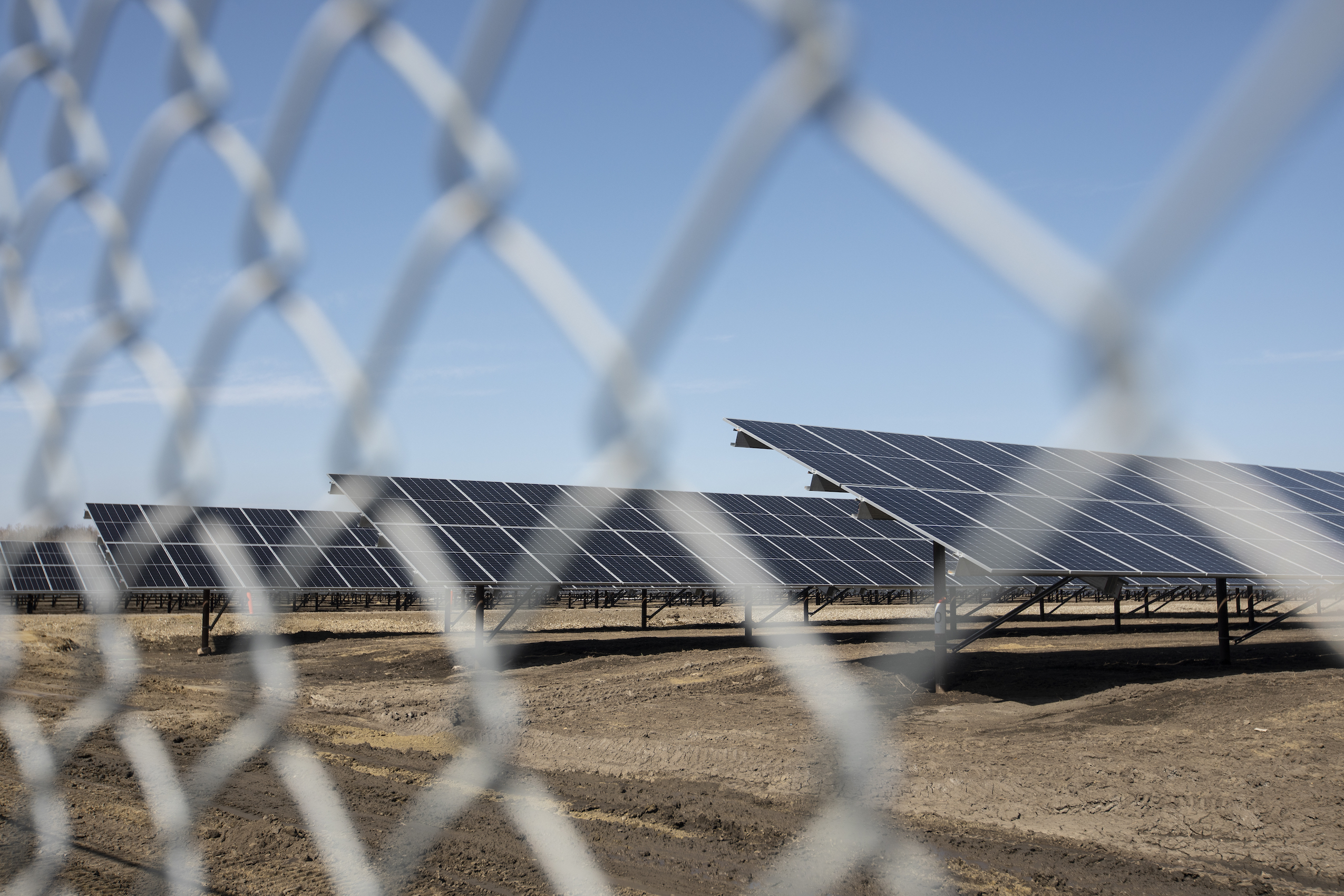
On June 23, the ministry drafts a briefing note for the minister’s meeting with Dahl-Rees. It contains the earliest documented reference to the renewables pause, but the details of the meeting are redacted in the note.
Neudorf meets with Johannson from the system operator for the first time. The agenda going into the meeting is broad and appears geared toward getting the minister up to speed, according to documents.
After the meeting, Johansson updates Mike Law, the president and CEO of the Alberta Electric System Operator, saying the minister is “still” interested in pursuing a pause on renewable energy projects.
“The only unusual thing is there is still a desire to halt the new project pipeline,” Johansson writes in his update to Law.
An engineer with decades of experience in electricity who has worked for the grid operator for 15 years, Law is unequivocal in his opposition to the pause in a response to Johannson, calling it “very troubling.” He tells his staff the organization needs to push back against the government’s plan.
“We need to provide good messaging against [to the Government of Alberta] when we have the opportunity,” he writes to six of his colleagues in an email.
Law says a renewables pause and rumours of an inquiry would “throw industry into a tailspin.”
It would, he says in another email to the board chair, send a “closed-for-business message,” and would be “reputationally very challenging” for the province.
“If we make ourselves unwelcoming, investment will just go elsewhere,” he writes.
Johannson — who was appointed to the grid operator’s board in 2020 and who held several senior executive positions at pipeline giant TC Energy — warns Law to be “careful with your messaging on this.”
The day after Johannson meets with Neudorf, the minister sits down for the first time with Dahl-Rees at the commission. Documents The Narwhal obtained related to that meeting provide no clarity on what is discussed or the commission’s reaction to those discussions.
In text messages, the government-appointed chair of the grid operator tells Law he had a meeting with the minister. “The topic of a pause on new applications came up again,” Johansson writes in a text message to Law.
He says they talked again about a pause, which he writes “seems to be an attractive option for the minister.”
“My perspective is this is not the best approach — but I will be sensitive to ministerial desires,” Law writes in reply.
Neudorf’s calendar from that time, obtained through freedom of information, shows that meeting took place on July 6.
Three weeks after Johannson’s first known meeting with the minister, he sends an email to his board colleagues saying Neudorf has asked for a letter of support for a moratorium on renewable energy project approvals, according to documents.
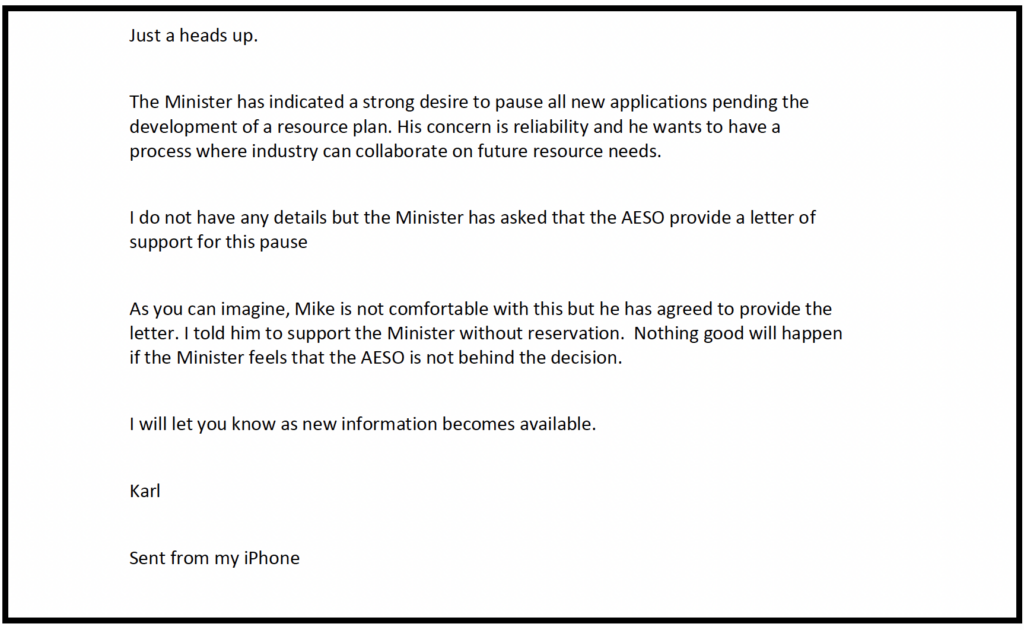
“As you can imagine, Mike [Law] is not comfortable with this but he has agreed to provide the letter,” Johannson writes on July 19. “I told him to support the minister without reservation. Nothing good will happen if the minister feels that the [Alberta Electric System Operator] is not behind the decision.”
Law signs a letter from the Alberta Electric System Operator to Minister Neudorf about the planned renewables pause.
“Thank you for advising us that the Government of Alberta will be requesting … a one-time, six-month temporary pause on the [Alberta Utilities Commission] accepting new power plant applications,” the letter reads.
“As the province’s independent system operator, the [Alberta Electric System Operator] will support the [Alberta Utilities Commission] in its implementation of a government directed six-month temporary pause.”
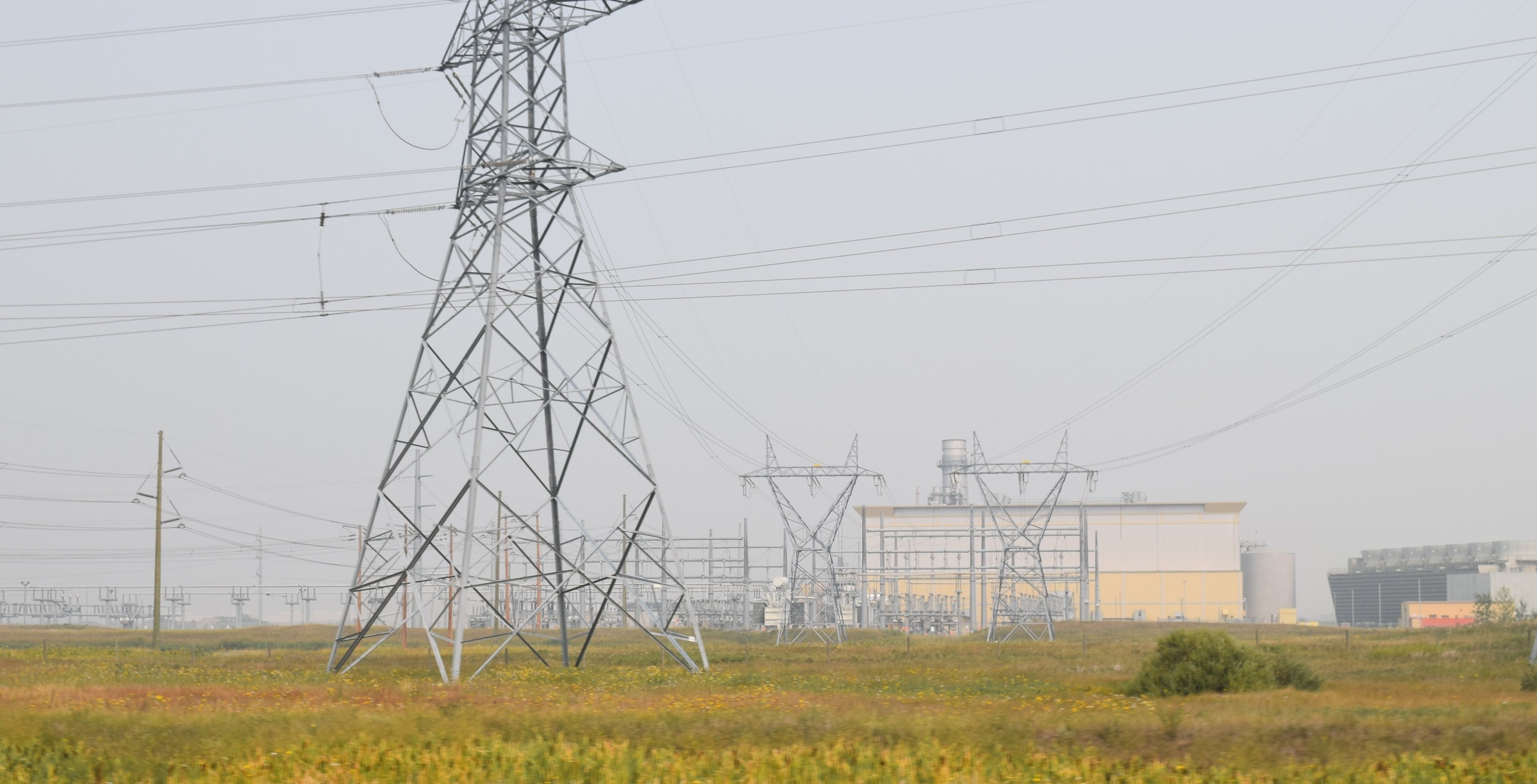
The letter does not indicate Law or the organization was asking for the pause.
Another briefing note obtained by The Narwhal from this time shows the minister met with an unknown individual or organization on July 20. That briefing note contains a section detailing many aspects of the moratorium, pre-dating both of the letters.
Two weeks after those letters were written, the government publicly announces its plans for the moratorium and an inquiry into regulations for building renewables projects.
The industry is left scrambling for answers, chief among them is what projects would be impacted and the nature and structure of the Alberta Utility Commission’s inquiry.
That letter from Law, and one from the commission, are highlighted as reasons for bringing in the pause when it was announced in August, but neither asked for the moratorium, despite claims by Premier Smith.
Smith doubles down on those claims when pressed by reporters on Aug. 14.
“The Alberta Electric System Operator asked for us to do a pause, to make sure that we could address issues of stability of the grid,” Smith says, adding that the grid’s regulator, the Alberta Utilities Commission, also asked for the pause.
The commission provides clarity on its process, saying it will continue to process applications already in the regulator queue up to the approval stage, at which point a project will have to wait for direction from the government.
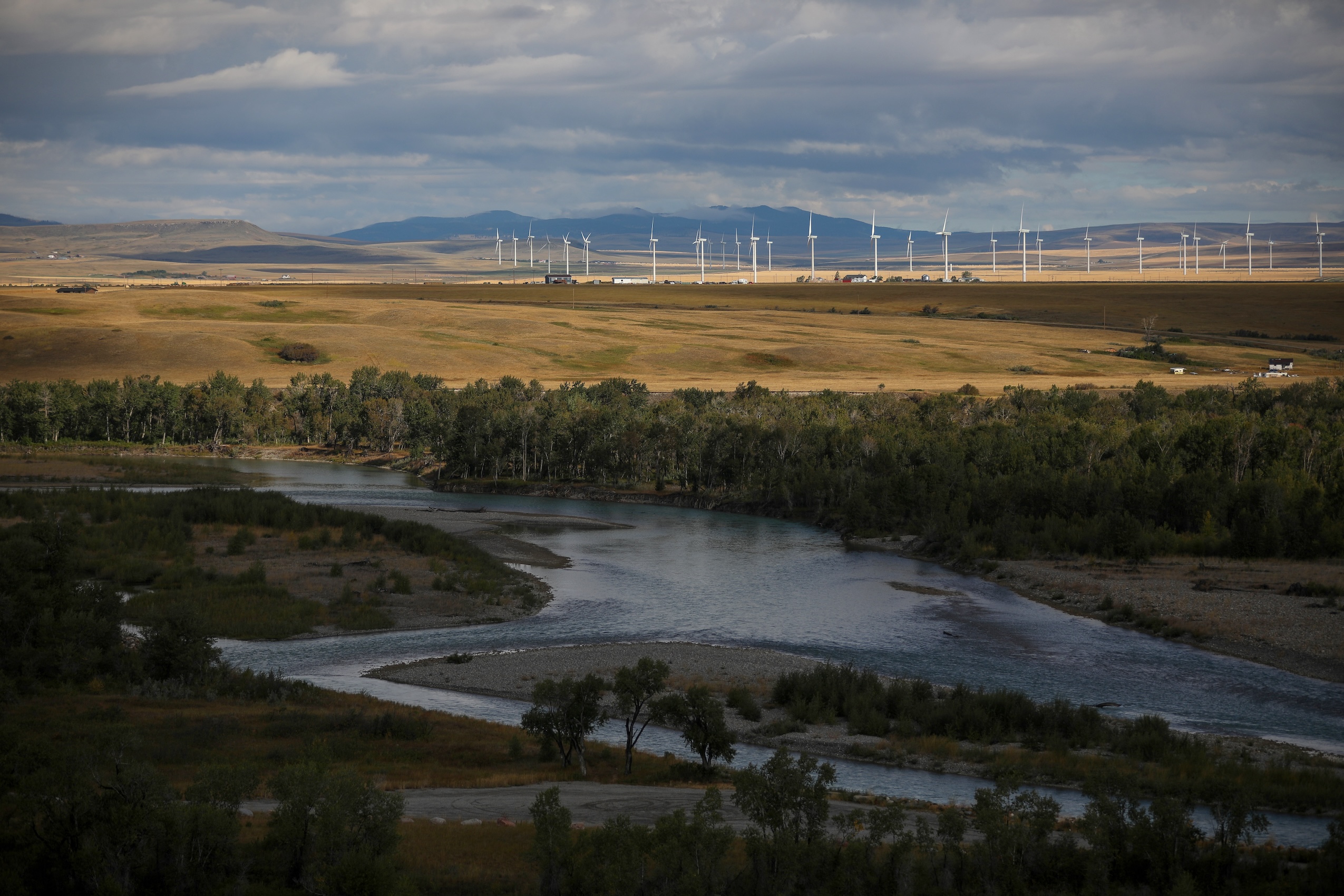
The commission releases new rules for renewable energy project applicants while it works on its inquiry. By Oct. 3, it releases information on the process for the first phase of its inquiry — it will look at the need for reclamation security deposits, the prospect of projects on Crown land and the impact of renewables on farmland and viewscapes.
The second phase of the inquiry is tasked with considering the impact of the surge in renewables on generation supply and grid reliability.
The regulator submits its report on the first phase of its inquiry to the provincial government on Jan. 31, 2024.
Neudorf releases that report to the public on Feb. 28 and outlines new rules around renewable energy projects in the province, barring them from large swaths of land. The rules include 35-kilometre buffer zones around protected areas and other “pristine viewscapes.”
Neudorf also says the government will take an “agricultural first” approach and ban all renewable projects on Class 1 and Class 2 agricultural land — meaning those with the best irrigation — unless a proponent can prove agriculture and renewables can co-exist on a property.
Municipalities will be allowed to participate in regulator hearings and there could be new rules around impacts on neighbours, transmission charges and reclamation security paid to the government.
Details on the buffer zones are vague.
The moratorium is officially lifted the next day, as scheduled, on Feb. 29.
The government releases a map providing more detail on where some of the buffer zones will be located, primarily along the eastern slopes of the Rockies. There are other pockets around UNESCO sites that prohibit wind farms, but questions still remain around rules that could bar turbines from other areas deemed to be visually significant.
The Alberta Utilities Commission submits its second report of the inquiry to the government. No details have been released at this time.
The Alberta Electric System Operator and Minister Neudorf’s office did not respond to requests for comment by publication time.
Get the inside scoop on The Narwhal’s environment and climate reporting by signing up for our free newsletter. Angello Johnson’s shoulders burn, and his arms...
Continue reading
First Nations are leading efforts to make sure lake sturgeon can find a home in...

We’re excited to share that an investigation by The Narwhal is a finalist for the...

A new documentary, Nechako: It Will Be a Big River Again, dives into how two...
